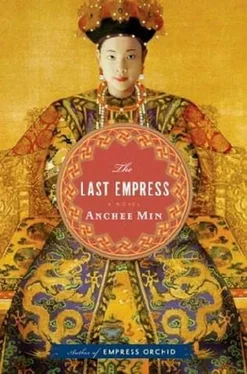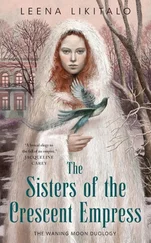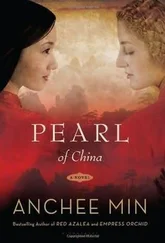"My country is being raped" was his first response after being presented with drafts of the treaties drawn up by the foreign powers. "When a sheep is cornered by a pack of wolves, will the wolves allow the sheep to negotiate? Will the sheep help decide how she should be eaten?"
Li Hung-chang was a master of business, and his skillful bargaining had saved his country but cost him his life. "Carving up China means creating a nation of new Boxers," he pointed out to the foreigners when they threatened to abandon negotiations. "Calling on Her Majesty to step down makes for a bad business deal because everyone in China will tell you that it is the Dowager Empress, not the Emperor, who will see your loans paid."
Li volunteered for the role of scapegoat so that the Emperor and I could save face.
I was sure that Li had regrets. He had given me so much, yet all I offered in return was disappointment after disappointment. It was amazing that he didn't overthrow Guang-hsu's regime. He would not have needed an army. He knew my vulnerability all along. His integrity and humanity humbled me. He was the best gift Heaven ever bestowed on the Ch'ing Dynasty.
The welcoming banners on the Forbidden City walls hid the damage done by the foreign artillery. When my palanquin approached my palace I saw that many statues and ornaments had been shattered or stolen. The Sea Palace, where all my valuable possessions had been hidden, was raided. The offices at Ying-t'ai had been burned. The fingers of my white-jade Buddha were broken. The Allies' commander in chief, the German field marshal Count Waldersee, was said to have slept in my bed with the notorious Chinese courtesan named Golden Flower.
Not wanting to be reminded of the shame, I moved to the modest Palace of Serenity, in the northeast corner of the Forbidden City. Its remote location and unkempt appearance made it the only spot the foreigners had not violated.
Three days after the court's return, Guang-hsu and I resumed audiences and received foreign envoys. We tried to put smiles on our faces. Sometimes our emotions slipped and unexpected words would tumble out. As a result, translators kept getting fired. One foreign minister later described my facial expression as "in between crying and smiling"-a kind of twisted grimace that he suspected was the result of a stroke. He also detected "a swelling around Her Majesty's eyes." He was right-I frequently wept at night. Others noticed that I rocked my chin and appeared to have trouble sitting still. They were right too: I was still trying to rid myself of lice.
I forced myself to apologize. With great effort I managed to wish happiness and health to the foreign representatives and dismiss them with a gracious nod.
When Li Hung-chang's name was mentioned at such audiences, which was often, I could not control my tears.
Li Lien-ying kept a close watch over me. He would call for a recess and take me to the back of the hall, where I would fall on my knees and sob. He kept a water basin and a makeup kit behind the curtains. I tried not to rub my eyes so that the swelling would go down.
The daughter of Yung Lu was going to be married, and he asked for my blessing. The groom was Prince Ch'un Junior-my sister's youngest son and Emperor Guang-hsu's brother. I had had my reservations about Ch'un until I'd recently met him again. He had just returned from a trip to Germany to apologize on behalf of the Emperor for the death of Baron von Ketteler. Prince Ch'un was a changed man. He was no longer so overbearing, and he listened more. For the first time, he credited Li Hung-chang and acknowledged and honored Li's diplomatic accomplishments. I offered my blessing not only because Yung Lu had accepted him as a son-in-law, but also because Prince Ch'un was the only hope left in the dynasty's bloodline.
I attended the wedding and found Yung Lu and his wife, Willow, to be happy, although Yung Lu's cough had worsened. None of us could have predicted that he would soon gain a grandson who would become the last Emperor of China.
Instead of having a traditional opera troupe, the guests were entertained with a silent moving picture show of a horserace. The idea came from Yuan Shih-kai, of course, who had borrowed the film from a diplomat friend at one of the legations. It was a grand experience for me. At first I thought what we saw were the images of ghosts. I kept turning my head back and forth between the screen and the film projector.
Yuan Shih-kai took this occasion to ask for my help. He said, "Your Majesty, my police force is having difficulty disciplining the royal princes."
I gave Yuan permission to enforce the law, and I asked him if he in turn could help me take care of a recent scandal.
"Elderly students who are against my abolishing the old civil service exam system have been protesting outside my palace," I said. "They demand that I withdraw my support of Western-style schools. Yesterday, three seventy-year-old students hanged themselves."
Yuan Shih-kai understood his mission. Within a week, his police cleared out the protesters.
When Yung Lu became too ill to attend audiences, Yuan Shih-kai took his place. I was not used to having someone else sit in Yung Lu's spot, and it was difficult not to let it affect me. The court without Li Hung-chang and Yung Lu didn't feel like my court. Perhaps I sensed that I would soon lose Yung Lu. I became desperate to hear his voice, but he couldn't come to me, and etiquette forbade me from visiting him at his home. It was kind of Willow to keep me informed of her husband's condition, but I was not satisfied.
I was never unhappier to have to attend the audiences, but the situation was delicate and demanded my presence. Yuan Shih-kai was a Han Chinese in a Manchu court. He was competent, clever and charming, but still, Emperor Guang-hsu refused to even look in his direction when addressing him. Prince Ch'un didn't get along with Yuan either. The smallest disagreement would turn into a fight. Neither side would back down unless I intervened.
On a freezing February morning in 1902, Robert Hart came for a private audience. I had wanted to meet with this man for many years. I got up before dawn and Li Lien-ying helped me to dress.
Looking at myself in the mirror, I thought about what to say to the Englishman. We would have been bankrupted if he had not so capably run the customs service, which provided one third of China's annual revenue. "Neither Li Hung-chang nor Yung Lu could manage it," I explained to Li Lien-ying, "because half of Hart's job is to collect taxes from foreign merchants."
"Robert Hart has been China's good friend," the eunuch said. "I can tell that my lady is excited about finally seeing what he looks like."
"Make me look as good as you can, please."
"How about a phoenix hairdo, my lady? It will take a bit longer, and the weight of the jewelry might make your neck sore, but it will be worth it."
"That would be nice. I don't have anything else to award Sir Robert. My appearance will speak of my gratitude. I wish I were younger and prettier."
"You look splendid, my lady. The only thing you need to complete your image is the long nails."
"They haven't grown back since we escaped Peking."
"I have an idea, my lady. Why don't you put on your golden nail cases?"
At eight o'clock Sir Robert Hart was led into the audience hall. He sat down ten feet from me. He was sixty-seven years old. My first impression was that he looked more like a Chinese than an Englishman. He wasn't ceiling-tall or as monstrously framed as I had imagined. He was a medium-sized man, dressed in a gold-laced purple Chinese court robe. He performed a perfect kowtow. He wished me health and longevity in flawless Mandarin, although I noticed that he had a southerner's accent.
Читать дальше












